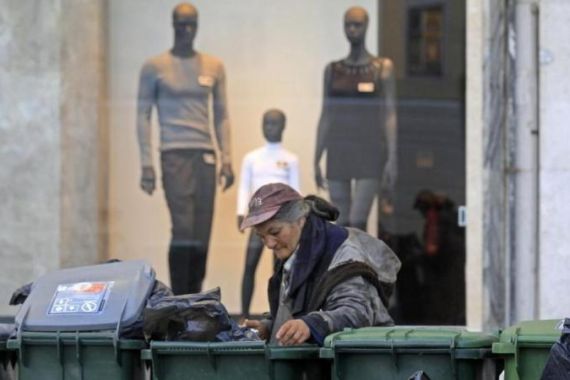Living la vida low-cost in Portugal
In the age of austerity, the life of an entire generation across Southern Europe is devalued.

In austerity-hit Portugal, McDonald’s has been promoting its fast-food meals with the campaign “Living la vida low-cost“. From the advertisement boards of bus shelters and from TV screens, the multinational chain is trying to entice the Portuguese to feast on its cheap hamburgers and Chicken McNuggets, which they can still afford. Video commercials, geared primarily towards a younger audience, urge the viewers to save on winter-time trips to North European countries by tying shopping cart wheels to skis and sliding down the green hills of Lisbon. What would be a better culmination of this exhilarating experience, than feasting on one of the “Euro-savings” hamburgers, featured at the end of the commercial and accompanied by the same refrain, “Living la vida low-cost”?
Indeed, many young people across Southern Europe lack the funds for anything more expensive than that. Among this demographic group, unemployment levels in Spain, Greece, Portugal and Italy reach between forty and fifty percent. Often forced by dire financial circumstances to live with their parents well into their thirties and beyond, they also undergo a kind of forced infantilisation as far as their gastronomic tastes are concerned. The prepackaged meals they are urged to consume are, above all, symbolic of the restricted gamut of choices available to them in all spheres of existence.
High cost of mass production
A little below the surface, however, the advertisement campaign tells us something not only about the cost of living but also about the cost of life or, better, of lives. First, the lives of animals processed by the fast-food industry are clearly stripped of any inherent worth. “Living la vida low-cost” requires mass production and slaughter of chickens and cows, their flesh converted into cheap McDonald’s fare. Second, the lives of the consumers are also relatively unimportant, if they are to be fed only fast food. “La vida low-cost” means death for animals and miserable survival, rather than a full-fledged life, for humans.
The campaign’s punch line undeniably alludes to Ricky Martin’s 1999 hit, “Living la vida loca“. It implies that the prices of food are so low that they verge on insanity. But there is another subtext to this allusion. After all, the words “loca” and “low-cost” describe a life that penurious consumers are forced to lead on meager unemployment benefits or on what, in Spain, is called “el colchon familiar” – literally, “the family mattress,” or on financial support older family members extend to the jobless youths. It is the true extent of the problem that reeks of insanity, however, seeing that the life of an entire generation across Southern Europe is devalued, suffused with overwhelming despair, and robbed of any hope for a better future.
|
The devaluation of life itself is hardly surprising in the age of nihilism, when corporate profits and salaries become the measures of individual and collective worth. |
Needless to say, the low personal cost of fast-food carries a heavy societal and environmental price tag. Regular consumption of such meals has been linked to numerous health problems and thus overload the already nearly bankrupt national health services in South European countries. Raising more poultry and cattle for slaughter results in unimaginable animal suffering, increased environmental pollution, and the runoff of residual growth hormones and antibiotics into the waterways. Oppression of the most precarious groups in human society is made of one cloth with that of animals and of our natural milieu as a whole.
Poverty as positive
The devaluation of life itself is hardly surprising in the age of nihilism, when corporate profits and salaries become the measures of individual and collective worth. From the standpoint of the state, large segments of unemployed citizens represent undesirable dead weight on the severely eroded social welfare system. Portugal’s Prime Minister, Pedro Passos Coelho, went so far as to recommend that people in search of jobs “leave their comfort zone” and immigrate to countries where employment is plentiful. Rather than create well-paying jobs within the national borders, citizens are invited either to move abroad or to look for “low-cost” alternatives to their basic living expenses.
The current commercial and political attempts to present poverty in a positive light, as the condition that fires up people’s ingenuity and strengthens their resilience, are redolent of certain trends in Portugal’s recent history. Under the dictator Antonio de Oliveira Salazar, a frugal and humble lifestyle was supposed to connote moral purity, simplicity, and fortitude. But while Salazar painstakingly associated an austere life to the ideally uncorrupted customs of the countryside, the perverse glamorisation of poverty by McDonald’s caters to the unfulfillable consumerist dreams of impoverished city dwellers. This is quite telling: Big multinational corporations are the new dictators in the age of austerity.
Michael Marder is IKERBASQUE Research Professor in the Department of Philosophy at the University of the Basque Country (UPV-EHU), and the author of The Event of The Thing: Derrida’s Post-Deconstructive Realism.